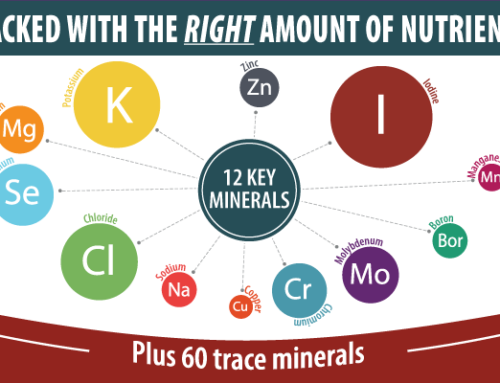There are many health benefits of selenium, even though it was only officially recognized as essential for human health in 1990. Since then, a great deal of publicity has been given to this trace mineral. This article reviews current research about the most widely recognized health benefits of selenium. One area of research relates to the way selenium seems to boost immunity and aid the respiratory system. This has broad public health implications.
This article includes research relating to the following health benefits of selenium:
- Selenium and respiratory infections
- Selenium for weight loss, diabetes, and metabolism
- Selenium and cancer
- Selenium may ward off prostate cancer
- Selenium may reduce bladder cancer risk
- Selenium and ovarian cancer
- Selenium and male fertility
- Selenium for hair
- Selenium and the brain
- Selenium and diabetes
Overview of the Health Benefits of Selenium
Selenium is a mineral required by the human body in small, trace amounts; however, it can make a big impact on longevity and health. Selenium helps regulate hormones involved in thyroid function, and one of the most important benefits is that it has antioxidant properties. The National Institute of Health’s Selenium Fact Sheet for Health Professionals also states: “Selenium, which is nutritionally essential for humans, is a constituent of more than two dozen selenoproteins that play critical roles in reproduction, thyroid hormone metabolism, DNA synthesis, and protection from oxidative damage and infection.”
Related article: Trace Mineral Deficiency – 9 Facts you Need to Know
Selenium intake may be associated with reduced cancer risk and appears to be a key nutrient that slows HIV progression to AIDS. It is required for sperm motility (the ability of sperm to move properly) and may reduce the risk of miscarriage. Selenium deficiency has been linked to poor mood. Some findings suggest that selenium deficiency may put people more at risk for heart diseases. Also, some medications can have a negative effect on selenium levels.
Studies show that there are health benefits related to selenium such as reduced risks due to respiratory infections—especially in the elderly. Others have shown that moderate selenium supplementation may reduce the risk of developing certain forms of cancer. This article notes that people should not take megadoses of selenium.
RDA for Selenium
Keep in mind that selenium is a trace element, which means that large doses are not advisable because of long-term side effects from taking too much. In other words, think of it as not too much, not too little; you want “just right.” The current recommended dietary allowance (RDA) for selenium for healthy individuals consuming a mixed North American diet is:
- Children: 20 mcg
- Males (11-18): 50 mcg
- Males (adults): 70 mcg
- Females: 55 mcg
- Pregnant: 65 mcg
- Lactating (1st 6 mos.): 75 mcg
Selenium deficiency
A deficiency of selenium can contribute to many conditions, including:
- Dry skin
- Dandruff
- The development of cataracts
- Fatigue
- Affect the efficiency of vitamin E utilization
- Hair loss
- Certain types of cancer
Margaret Rayman, professor of nutritional medicine at the University of Surrey, found that Selenium levels were significantly lower in Europeans than those in North Americans due to selenium-depleted European soil. She stated that probably the strongest link between selenium and health would be the effect on cancer risk.
Selenium Toxicity and the Benefit of Balance
Minerals and trace minerals are known to aid each other in their respective functions in the body. Many body processes depend on a particular mineral or trace mineral, and those processes require another essential element at the same time because they affect each other. It is important to keep minerals and trace minerals in balance because they can each help prevent toxicity problems with other elements. Selenium is a good example of these complex interrelationships. According to the Physicians Desk Reference (PDR), selenium has been shown to diminish the effects of two toxic minerals, cadmium and arsenic. (Source: PDR for Nutritional Supplements, pg. 417.)
As mentioned in the RDA section of this article, it is important to note that selenium is a trace element and mega doses are not advisable. Selenium risks would show on a graph in a U-shaped curve where people can have health problems when they get either too little or too much.
For people who have healthy levels of selenium in their blood, there are clear risks of supplementing too much. There are health supplements on the market that irresponsibly dose at many times the RDA. Instead, people who choose to supplement should select a more moderate amount over time.
Selenium researcher, Professor Margaret Rayman explains, and her findings are summarized in this article:
In some cases, additional selenium appeared to have adverse effects. This indicates that the supplements only benefit people with too little selenium in their diet, according to Professor Margaret Rayman, from the University of Surrey in Guildford…Prof Rayman added, ‘However, there are various health benefits, and no extra risk, for people of lower selenium status (blood level less than 122 micrograms per litre) who could benefit from raising their status…’” (Source: Beware Selenium – too much is harmful scientists warn, by Jonn Von Radowitz, February 29, 2012, published at Independent.ie)
Related article: Liquid Trace Minerals – How to Judge a Mineral Product
Ionic Selenium
Chris D. Meletis, N.D., Dean of naturopathic medicine and chief medical officer at National College of Naturopathic Medicine says that many trace mineral supplements contain mineral forms that aren’t well utilized by the human body.
The body preferentially absorbs minerals in ionic form while other mineral forms (organic, colloidal) are not as readily absorbed.
This indicates that ionic selenium is the best form.
Related article: Ionic minerals vs. Colloidal minerals – Definitions and Hype
Selenium and Respiratory Health
Researchers at the University of North Carolina at Chapel Hill found that mice fed a diet deficient in selenium showed more lung inflammation after being exposed to influenza (the flu) than those who ate enough. (Article title: Selenium deficiency increases the pathology of an influenza virus infection. The study appears in the Journal FASEB (2001; 15:1481-1483, at: https://www.fasebj.org)
Another study indicates that selenium and zinc helped protect elderly patients from respiratory infections such as influenza. The conclusion stated for this abstract is very compelling:
Low dose supplementation of zinc and selenium provides significant improvement in elderly patients by increasing the humoral response after vaccination and could have considerable public health importance by reducing morbidity from respiratory tract infections.
(Article title, “Impact of trace elements and vitamin supplementation on immunity and infections in institutionalized elderly patients: a randomized controlled trial. MIN. VIT. AOX. geriatric network,” published at: https://www.ncbi.nlm.nih.gov/)
Another study found that “…selenium supplementation was shown to modulate the inflammatory response in respiratory distress syndrome patients by restoring the antioxidant capacity of the lungs…” (Abstract title: “Selenium, Selenoproteins, and Immunity” Published at: https://www.ncbi.nlm.nih.gov/pmc/articles/PMC6163284/h)
Selenium and Immunity
An abstract of a study by Joseph C. Avery and Peter R. Hoffman states:
Selenium is an essential micronutrient that plays a crucial role in development and a wide variety of physiological processes, including effect immune responses. The immune system relies on adequate dietary selenium intake.
That abstract goes on to explain that benefits are mixed when people already have adequate selenium levels, but the effects are the strongest when people go from not having enough to having enough. The abstract also states that, “Selenium supplementation, for the most part, is immuno-stimulatory,” or in other words, selenium boosts the body’s natural immune system. (Abstract title: “Selenium, Selenoproteins, and Immunity” Published at: https://www.ncbi.nlm.nih.gov)
Selenium’s role in immunity may be especially tied to the thyroid including autoimmune thyroiditis, a condition associated with euthyroidism, or hypothyroidism. Read the next section for more health benefits of selenium related to the thyroid.
Selenium for Hypothyroidism
The U.S. National Institute for Health published an abstract reviewing the link between selenium and hypothyroidism which states:
In adults, the thyroid is the organ with the highest amount of selenium per gram of tissue…In the thyroid, selenium is required for the antioxidant function and for the metabolism of thyroid hormones…
In conclusion, “Maintaining a physiological concentration of selenium is a prerequisite to prevent thyroid disease and preserve overall health.” (Article title: Selenium and Thyroid Disease: From Pathophysiology to Treatment, published at: https://www.ncbi.nlm.nih.gov)
A 2013 paper published in “Clinical Endocrinology” noted that selenium supplementation may decrease anti-thyroid antibodies, which can help keep the thyroid healthy. (Article source: https://www.livestrong.com/article/523074-benefits-of-zinc-selenium/)
Selenium and Cancer
One of the most compelling health benefits of selenium relates to its role in cancer prevention. Selenium has been described by some scientists as an “anti-cancer” nutrient, and extensive research is currently underway throughout the world to better understand this role. Read an abstract published on the U.S. National Institute for Health here: Selenium: its role as an antioxidant in human health. Published at: https://www.ncbi.nlm.nih.gov/pmc/articles/PMC2698273/)
Numerous studies have found that people who live in areas rich in selenium in their soil and drinking water have lower rates of cancer. (Schauss, A.G. Minerals, Trace Elements and Human Health. Life Sciences Press: Tacoma, (WA), 1996.)
While low selenium status does not, by itself, cause cancer, it appears that not having enough selenium increases susceptibility to carcinogens. One possible explanation: selenium is one of the minerals that protects against too much cadmium, a toxic mineral. (ibid, Schauss)
Researchers at Cornell University published a study in “Biomedical and Environmental Sciences” in 1997 on the recurrence of different types of skin cancers from 1983 through 1993. Although selenium had no effect on skin cancer recurrence, selenium supplements significantly reduced the development and total death from all cancers. (Source article: What is Sodium Selenite used for? Published on Livestrong.com)
Selenium May Ward Off Prostate Cancer
According to Cancer.org, about 1 man in 9 will be diagnosed with prostate cancer during his lifetime, and about 200,000 men will be diagnosed in the United States alone each year. Men who want to reduce their prostate cancer risk may want to make sure they’re getting enough selenium. Some early studies found that taking selenium supplements might lower prostate cancer risks, including one in the December 2001 issue of the Journal of Urology. It found the following:
Men who had the lowest blood levels of selenium were four to five times more likely to develop prostate cancer than the men with the highest levels of selenium.
(Source: Brooks JD, Metter EJ, Chan D, et al. J Urol. 2001; 166:2034-2038. For more information. Abstract title: Plasma Selenium Level Before Diagnosis and the Risk of Prostate Cancer Development, published on the Journal of Urology at: https://www.auajournals.org.)
A Harvard-based study involving 34,000 men found that men with the lowest levels of selenium had three times the likelihood of developing advanced prostate cancer compared to those with the highest selenium levels. Men with the highest selenium levels at the start of the study had a 65% lower incidence of advanced prostate cancer than the men with the lowest levels, even after taking other prostate cancer risk factors into account.
The Harvard team calculated that a daily consumption of 159 micrograms of selenium would prove protective. A second Harvard study followed in 2004, finding over the next 13 years that men with the highest initial blood selenium levels had a 48% lower incidence of advanced prostate cancer than those with the lowest levels.
(Source article: Selenium and prostate cancer, published in Harvard Health Publishing, Harvard Medical School)
Selenium May Reduce Bladder Cancer Risk
Increasing one’s intake of selenium—both from dietary and supplemental sources—may reduce the risk of bladder cancer. A 2009 abstract states that, “Emerging evidence indicates a potential role of selenium in the prevention of several types of cancer, including bladder cancer.” Near the conclusion, the researchers added that:
Experimental data indicate potential anticarcinogenic effects of selenium, yet the exact molecular mechanism(s) remains unknown.
(Abstract title: Selenium and Risk of Bladder Cancer: A Population-Based Case-Control Study, published at: https://www.ncbi.nlm.nih.gov)
Altered Trace Element Levels Common in Men with an Enlarged Prostate
Medical science has yet to fully understand the underlying cause of enlargement of the prostate. What is known, however, is that there are changes in the levels of certain trace elements (copper, zinc, selenium, and manganese) that correspond with the severity of benign prostatic hyperplasia (BPH) symptoms and prostate volume. A study published in Trace Elements and Electrolytes reports a significant decrease in zinc and selenium, two essential trace elements, in men with acute urinary retention (inability to urinate or pain while urinating), a symptom of BPH. Further, researchers also found a significant decrease in the level of zinc and manganese in men with mild to severe prostate enlargement. The researchers concluded, “These studies clearly indicate the possible prognostic, diagnostic, and therapeutic roles of trace elements in the management of benign prostatic hyperplasia.” (Source: Trace Elements and Electrolytes Vol. 23(2): 119-23, 2006).
Related article: Electrolytes are Essential for Life, Health, and Peak Performance
Selenium and Male Fertility
Selenium is well-known for its preventive role in certain forms of cancer but this essential trace element may also play a valuable role in male fertility. According to the recently published PDR for Nutritional Supplements, infertile men have been found to have low blood levels of selenium. The PDR cites a study conducted in Scotland comprising 64 infertile men. Typically, levels of selenium have been found to be low in European men and women. In the study, the control group supplemented their diet with selenium over a two-year period. At the study’s conclusion, five of the selenium-supplemented men had fathered children. None of the men in the placebo group had fathered children. Researchers hypothesize that selenium appears to protect sperm from oxidative damage and also appears to help maintain the structural integrity of mature sperm. (Source: PDR for Nutritional Supplements, pg. 419.)
Selenium for Hair
People commonly ask about vitamin and mineral supplementation and diet as a means to prevent or manage hair loss. There are no simple answers given the enormous and conflicting evidence that exists on the health benefits of selenium related to hair. Micronutrients are very important in the normal hair follicle cycle, and one scholarly review examined the research, with findings that state:
“Iron, vitamin D, folate, vitamin B12, and selenium are vitamins and minerals that may be involved in hair graying/whitening during childhood or early adulthood. Supplementing these deficient micronutrients can improve premature graying.” It goes on to say, “A clinical trial in patients with ovarian cancer undergoing chemotherapy showed a significant decrease in hair loss…The authors concluded that ingesting selenium is a supportive element in chemotherapy.” (Source abstract: The Role of Vitamins and Minerals in Hair Loss: A Review. Published at: https://www.ncbi.nlm.nih.gov/pmc/articles/PMC6380979/)
Another article indicates that female hair loss around menopause may be related to too much selenium. “Although much less common than selenium deficiency, selenium toxicity can affect individuals as a result of over-supplementation, which results in hair loss.” (Source article: Nutrition of women with hair loss problem during the period of menopause. Abstract published at https://www.ncbi.nlm.nih.gov)
Keep in mind that too much selenium has been shown to contribute to hair loss and brittleness.
Selenium and the Brain
Selenium is needed for the brain and other tissues, and selenium deficiency may be linked to a reduced antioxidant capacity in the brain. In studies, a selenium deficiency in the brains of lab animals may be linked with a reduced glutathione peroxidases (GPx), or antioxidant capacity, in the brain.
“These results suggest that the antioxidant capacity of rats and mice differ, leading to a differential susceptibility to the oxidative stress caused by MDMA in situations of low dietary Selenium.” (Source abstract: Differential effect of dietary selenium on the long-term neurotoxicity induced by MDMA in mice and rats, published at: https://www.ncbi.nlm.nih.gov)
Related article: Supplements for Brain Function
Selenium and Diabetes
Selenium is an insulin-like trace mineral that transports glucose into tissue for conversion into energy, according to research published in the journal Cellular and Molecular Life Sciences. Caution is in order, however, because researchers do not fully understand the mechanisms by which selenium imitates insulin. The latest research seems to point to a U-shaped curve where diabetes risks exist for both selenium deficiency and selenium toxicity.
One study found that most of the diabetic subjects had substantially more selenium in their blood, leading some researchers to recommend against supplementation. (Source article: Are Selenium Levels Linked to Diabetes? Published in Scientific American.)
Another cross-sectional study with 5,423 subjects in China highlighted the complex relationship of selenium and blood sugar. The study’s abstract stated, “A review article [3] that comprehensively investigated the association between selenium and type 2 diabetes concluded that this complicated relationship may be explained by the possible harm that occurs both below and above the physiological range for optimal activity of some or all selenoproteins.” (Source article: The association between dietary selenium intake and diabetes: a cross-sectional study among middle-aged and older adults.” Published in the Nutrition Journal.
We hope you have enjoyed this article on the health benefits of selenium, presented by Mineral Resources International, a 50-year-old family business that extracts minerals from Utah’s Great Salt Lake.






